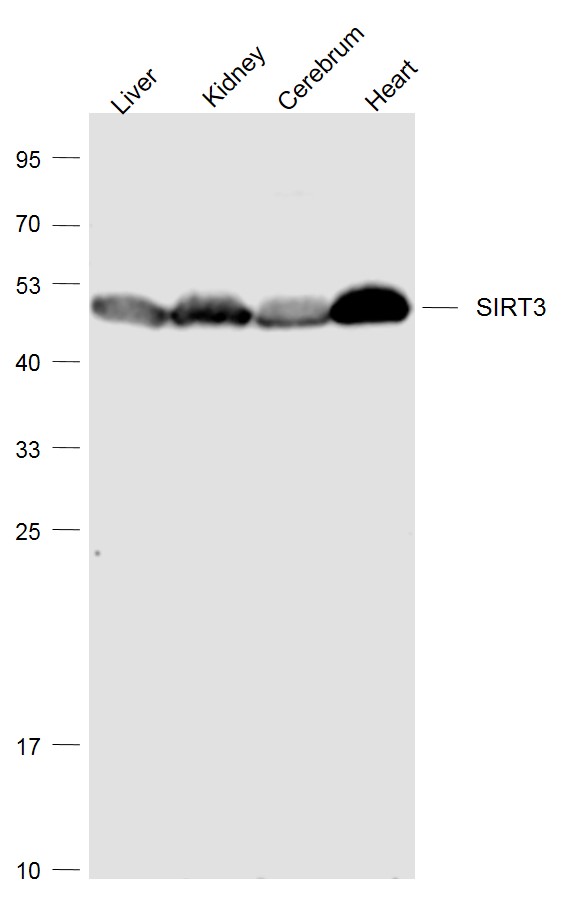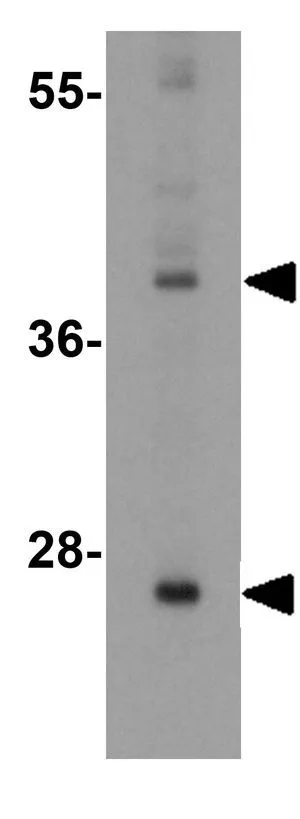
WB analysis of human liver lysate using GTX89507 SIRT3 antibody, C-term. Dilution : 0.2microg/ml Loading : 35microg protein in RIPA buffer
SIRT3 antibody, C-term
GTX89507
ApplicationsWestern Blot
Product group Antibodies
ReactivityHuman
TargetSIRT3
Overview
- SupplierGeneTex
- Product NameSIRT3 antibody, C-term
- Delivery Days Customer9
- Application Supplier NoteWB: 0.1-0.3microg/ml. *Optimal dilutions/concentrations should be determined by the researcher.Not tested in other applications.
- ApplicationsWestern Blot
- CertificationResearch Use Only
- ClonalityPolyclonal
- Concentration0.50 mg/ml
- ConjugateUnconjugated
- Gene ID23410
- Target nameSIRT3
- Target descriptionsirtuin 3
- Target synonymsSIR2L3, NAD-dependent protein deacetylase sirtuin-3, mitochondrial, NAD-dependent deacetylase sirtuin-3, mitochondrial, NAD-dependent protein delactylase sirtuin-3, SIR2-like protein 3, mitochondrial nicotinamide adenine dinucleotide-dependent deacetylase, regulatory protein SIR2 homolog 3, silent mating type information regulation 2, S.cerevisiae, homolog 3, sir2-like 3, sirtuin type 3
- HostGoat
- IsotypeIgG
- Protein IDQ9NTG7
- Protein NameNAD-dependent protein deacetylase sirtuin-3, mitochondrial
- Scientific DescriptionThis gene encodes a member of the sirtuin family of proteins, homologs to the yeast Sir2 protein. Members of the sirtuin family are characterized by a sirtuin core domain and grouped into four classes. The functions of human sirtuins have not yet been determined; however, yeast sirtuin proteins are known to regulate epigenetic gene silencing and suppress recombination of rDNA. Studies suggest that the human sirtuins may function as intracellular regulatory proteins with mono-ADP-ribosyltransferase activity. The protein encoded by this gene is included in class I of the sirtuin family. Two alternatively spliced transcript variants that encode different proteins have been described for this gene. [provided by RefSeq, Jul 2008]
- ReactivityHuman
- Storage Instruction-20°C or -80°C,2°C to 8°C
- UNSPSC12352203
References
- Huang YT, Chen YY, Lai YH, et al. Resveratrol alleviates the cytotoxicity induced by the radiocontrast agent, ioxitalamate, by reducing the production of reactive oxygen species in HK-2 human renal proximal tubule epithelial cells in vitro. Int J Mol Med. 2016,37(1):83-91. doi: 10.3892/ijmm.2015.2404Read this paper





